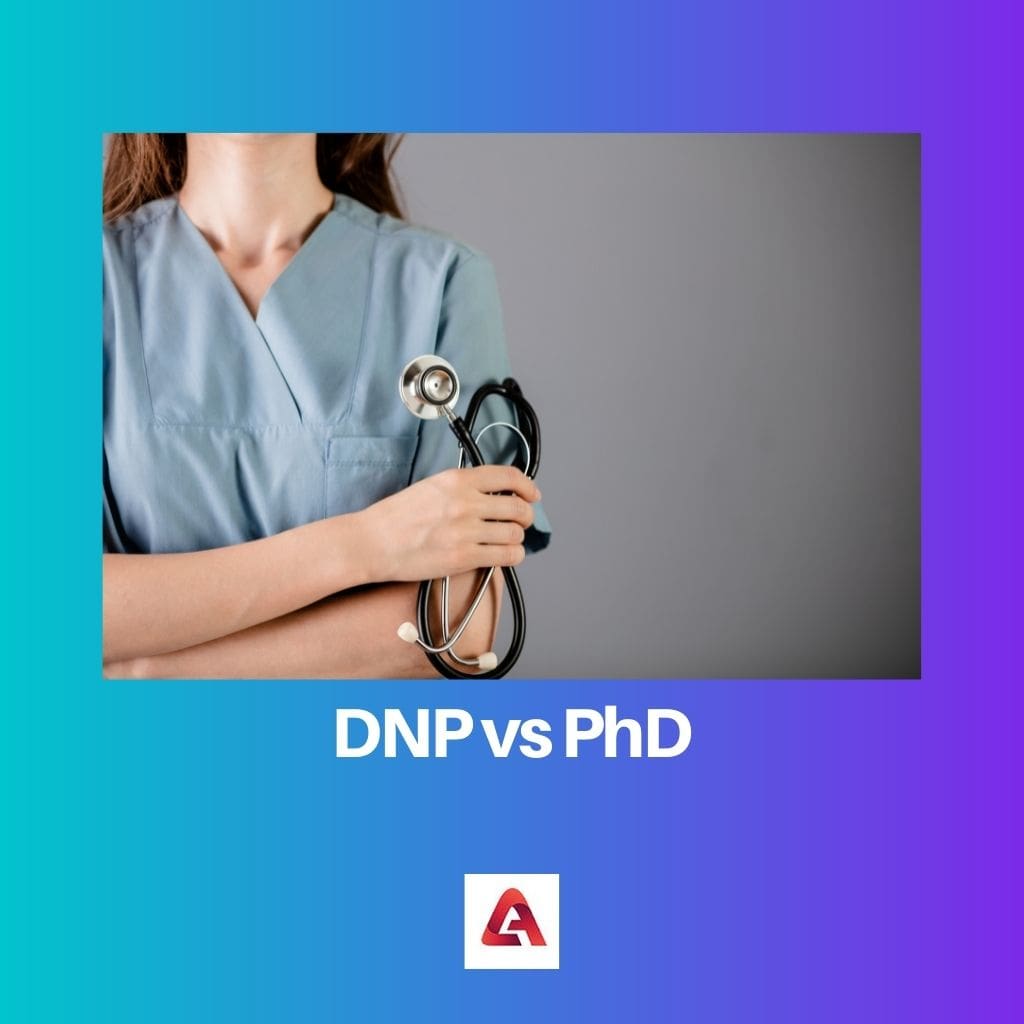DNP and PhD are advanced degrees that a practising nurse can acquire in healthcare.
Key Takeaways
- A Doctor of Nursing Practice (DNP) is a professional doctorate focused on clinical practice and leadership in nursing, preparing graduates for advanced roles in healthcare.
- A Doctor of Philosophy (Ph.D.) in nursing is an academic research-based degree that prepares graduates for academia, research, or healthcare administration careers.
- The choice between a DNP and a Ph.D. in nursing depends on an individual’s career goals and interests, with the DNP providing advanced clinical skills and the Ph.D. emphasizing research and academic pursuits.
DNP vs PhD
The difference between DNP and a PhD is to obtain a DNP degree; the applicant should complete a specific clinical project that can prove evidence-based practices done by the applicant. PhD programs are based on genuine research and methodology followed by a final dissertation and its defence.

DNP (Doctor of Nursing Practice) is a terminal clinical practice degree. In contrast, a PhD (Doctor of Nursing) is a research-focused degree and a terminal degree in nursing.
Anyone with proper qualifications in nursing can apply for DNP or PhD in nursing. DNP programs can be pursued as part of specializing in nursing practice but applying for a PhD program, a post-graduate certificate is an essential qualification.
Comparison Table
| Parameter of Comparison | DNP | PhD |
|---|---|---|
| Curriculum | Applying the experience obtained through research into nursing practice and acquiring expertise in the field. | Various theories related to nursing research development of research faculty. |
| Final project | The final project of my DNP includes a clinical paper and its presentation, as other practical-based works. | The final product of a PhD is mostly a dissertation that can make a notable contribution to the nursing field along with the defence of the dissertation. |
| Research practices | Research practices of DNP include theory as well as statistics. | Research practices of PhD include in-depth and proper faculty-guided research products. |
| Clinical practice | DNP id requires clinical practice of up to 1000 hours. | PhD program of Nursing Practice requires only a minimum duration of clinical hours. |
| Scope | Management positions in healthcare, Leadership in nursing, government, academics, administration, etc. | PhD degree in nursing is helpful for the positions of nursing researcher, health policy posts, and nursing faculty posts. |
What is DNP?
DNP is a terminal degree in nursing practice to make the degree holders combine their leadership, organizational, clinical and economic skills to create better patient care programs and work with more power and efficiency to fulfil a leading position in the field of healthcare.
A DNP-qualified nurse can perform nursing interferences that can influence the healthcare sector for persons and the community. These outcomes may include:
- Providing better care for patients
- Ensure better management in the areas of patient care and patient populations
- Lend a hand in the administrative field of healthcare and nursing organizations
- To be active in the development and implementation of health policies.
DNP is for practising nurses searching for a high-level degree in the field of nursing practice and prefers to acquire the highest positions in the same area, such as administration, management, or leadership.
The incorporation of DNP degrees in the healthcare sector was based on the following factors.
- The fast expansion of knowledge in the nursing field.
- The amplified complication of the care of patients.
- National-level concerns regarding the quality of nursing practice and concerns about patient safety.
- The shortage occurred in the number of practising nurses and the demand for high-level, educated leaders with expertise and power.
- Shortage of nursing faculty with doctoral degrees.
- Potential to prepare a highly equipped and efficient healthcare team.
The DNP programs emphasize areas that can provide support in leadership in nursing, systems management, decision-making based on supporting data, and quality improvement.
DNP is distinguishable from other terminal degrees for nursing professionals, such as PhD, DNSc, ND, etc., as it emphasises practice-based training on clinical applications. The duration of this course is between three to six years, but different countries and different universities follow different schedules and time.

What is PhD?
PhD in nursing is a research-oriented terminal degree in health care, similar to those from the other fields in course content and methodologies.
A PhD holder in nursing is engaged in teaching, research programs, program evaluations, writing and publishing related books, leading different organizations in the healthcare sector and working for governments to assist in policymaking and ensuring quality and updating in the field.
A PhD degree holder is not work in the hands-on care of patients but more in helping to increase the quality and professionalism in the field.
A nursing PhD holder can work in the following fields.
- Member of Nursing Faculty
- Nursing Research Director
- Clinical Service Director
- Administrative positions in pharmaceutical companies
- Administrative positions in research institutes
- Administrative positions in advocacy organizations
- High-level positions in healthcare IT corporations and many more.
PhD degree in nursing is also a high level, research-oriented degree with the same potential of other PhD degrees that provides numerous high-level positions to its holder.

Main Differences Between DNP and PhD
- The main difference between DNP and PhD is the application and relevance of each of these terminal degrees in the healthcare sector.
- DNP is beneficial to improve the clinical practices in nursing and the high-level management and policy creation in the field. PhD is focused on nursing research and developing research related faculty.
- DNP is more clinical oriented where PhD is more focused on following research methodologies and theories.
- The end product of DNP consists of a clinical paper and its presentation whereas PhD requires a dissertation and its defense.
- Clinical practice is more in DNP course, whereas PhD requires only a minimum amount of clinical practice.

- https://www.sciencedirect.com/science/article/pii/S8755722315000320
- https://journals.lww.com/jaanp/Fulltext/2019/02000/A_model_of_successful_DNP_and_PhD_collaboration.8.aspx

The information provided about the scope and significance of a DNP degree in nursing is truly enlightening. It’s inspiring to see the potential impact of such advanced education.
I couldn’t agree more, Qsimpson. The article effectively highlights the transformative possibilities associated with a DNP in nursing.
The article offers a compelling rationale for the growing importance of DNP degrees in nursing. It underscores the need for highly skilled professionals in healthcare leadership.
I share your sentiment, Thill. The article effectively highlights the strategic role of DNP-prepared professionals in addressing critical challenges within the healthcare sector.
I appreciate the thorough comparison between DNP and PhD degrees in nursing. It’s clear that the choice must align with one’s career objectives and preferences.
Absolutely, Daniel Hall. Choosing between these two degrees should be a well-informed decision based on individual aspirations.
Indeed, Daniel Hall. The article provides valuable insight for those considering advanced education in nursing.
I expected a more in-depth analysis of the differences, especially in terms of coursework. The article feels somewhat lacking.
This article is an excellent overview of the differences between a DNP and a PhD in nursing. It is very informative and helpful to those considering these advanced degrees in nursing.
I completely agree, Fjames. The content is organized and detailed, making it an insightful read.
The detailed comparison of DNP and PhD qualifications is highly informative. It equips individuals with the necessary insights to make informed choices about their educational pursuits.
Absolutely, Oscar Adams. The article is instrumental in guiding prospective students through their advanced nursing education decisions.
The article provides a comprehensive overview of the significance and scope of DNP and PhD in nursing. It’s an excellent resource for those considering these advanced degrees.
I couldn’t agree more, Barry Allen. The depth of information presented in the article is truly valuable for aspiring nursing professionals.
The comprehensive comparison table is quite useful in understanding the differences between DNP and PhD programs in nursing. It’s a great resource for prospective students.
Absolutely, Anna Saunders. The table offers a clear and concise breakdown of key distinctions between the two degrees.
This article presents a clear distinction between DNP and PhD in nursing, offering an insightful review of the two advanced degrees. It’s a valuable reference for prospective students.
Absolutely, Sofia Ward. The article is a commendable resource for individuals navigating the choices between DNP and PhD programs in nursing.
The detailed breakdown of the DNP and PhD programs is commendable. It offers valuable guidance for those seeking to further their careers in nursing.
Absolutely, Samuel Lewis. The content is rich in insight and provides a holistic view of these advanced nursing degrees.
I concur, Samuel Lewis. The thorough analysis in the article ensures readers gain a comprehensive understanding of the choices available.